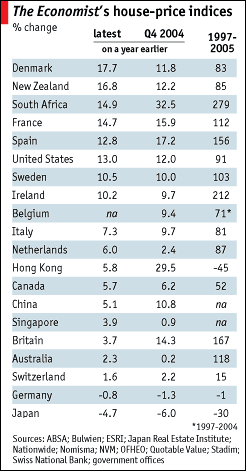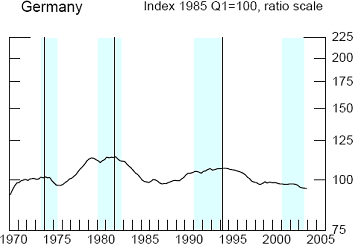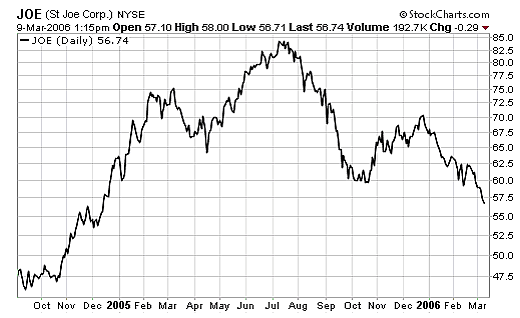| Home | About Us | Resources | Archive | Free Reports | Market Window |
Where Real Estate Is Cheap NowBy
Monday, March 13, 2006
Greetings from New Zealand’s hottest real estate market... Queenstown. The median home price here has jumped from NZ$200,000 in 2001 to NZ$600,000 today (NZ$=New Zealand dollar). That’s an extraordinary rise in five years. As my wife and I walked Queenstown, we said this is the perfect type of place to buy a house... once the real estate market here collapses! Today I’ll explain what I mean... Queenstown is the adventure sports capital of the world, striving to be both Aspen and Lake Tahoe. Just today, we pulled off the road to watch people throw themselves off a bridge, over 125 feet down. They were doing this on purpose... you see, Queenstown is the birthplace of bungee jumping. If it’s a crazy idea, folks in Queenstown are probably doing it.
Going on this simple premise, you can make a lot of money...To make money in real estate, you have to do one of two things. Baltimore might be a good example of this first one. I believe the founder of Agora (the publisher ofDailyWealth), Bill Bonner, bought some of Baltimore’s nicest old buildings for $1, with the promise to invest heavily to renovate them. Those buildings are now worth millions today. It was bold to buy in Baltimore city over a decade ago. Without a doubt, everyone must have told Bill he was crazy to buy. But Bill bought things of extraordinary value. Now, the Baltimore market has recovered and surpassed its old highs. Now everyone thinks real estate is close to a sure thing in Baltimore. The lesson here is this: In order to make a fortune in real estate, you’ve got to be willing to buy when everyone says you are crazy to buy. And the peak in the market is likely close when everyone thinks real estate is a sure thing. It’s hard to buy something everyone else hates. It’s uncomfortable. But the crazier people think you are, chances are, the more money you’ll make. To give the market time to come around, plan on holding for five years. The problem with this strategy now is nearly every major real estate market seems expensive. So where can you go that’s cheap and hated? According to The Economist table above, three places have seen property prices fall over the last decade: Hong Kong, Japan, and Germany. Let’s take a quick look at Germany: As the chart below shows, when adjusted for inflation, real estate in Germany is as cheap as it’s been since the 1970s. And most people think you’d be crazy to buy, so it’s probably time to learn more about this market, to see if there’s great value. But I prefer to wait for what looks like an uptrend in prices before I even consider it...
While we spend time looking at cheaper markets like Germany, many of the red-hot markets like Queenstown, New Zealand will bust. The ultimate buy signal, as always, is when even the realtors there think buying is a bad idea. “Too much upkeep, not enough renters now,” they’ll say. And I’ll ignore them and buy. I’ve heard it before from realtors... I last heard it in Buenos Aires a few years ago, and I made a bid on the nicest apartment in the city I could find. My bid wasn’t accepted, and now, no doubt, that property has soared in value. But I’m sure to find dejected realtors again somewhere in the world. And I’ll be glad. Then I’ll know we’re close to the bottom. I’ll let you know when I hear it. But in Queenstown, New Zealand, we’re not even close. Good investing, Steve Market NotesNEW HIGHS OF NOTE LAST WEEK Long-term interest rates… 10-year bond yield hits new high
NEW LOWS OF NOTE LAST WEEK
Live cattle… large beef herds Last week, St. Joe continued a very bad 2006, sliding to its lowest levels since 2004. This is either a great chance to buy land cheaply, or a bad sign for Florida real estate. It’s anybody’s guess. The decline of JOE (18 month chart):
-Brian Hunt |
Recent Articles
|
||||||||




